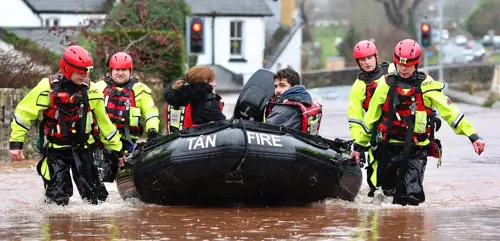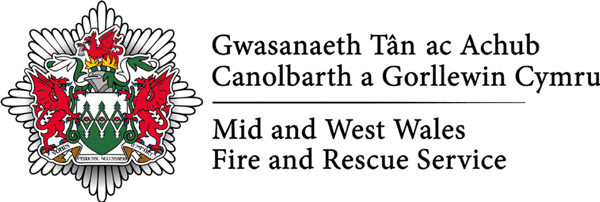Within the Mid and West Wales Fire and Rescue Service area a total of nearly 31,000 properties are at risk from flooding. Of these nearly 24,000 are at risk from river flooding and over 7,000 at risk of tidal flooding.

Within the Mid and West Wales Fire and Rescue Service area a total of nearly 31,000 properties are at risk from flooding. Of these nearly 24,000 are at risk from river flooding and over 7,000 at risk of tidal flooding.
By undertaking a few initial preparations you can significantly reduce the damage and upset caused by a flood – especially if you live in an area where there is a high risk of flooding, or if you have had a flood before, or if you are elderly, in poor health or disabled.
Councils, the emergency services and Natural Resources Wales will help where they can, but primarily you are responsible for protecting your own property.
If life is at risk, call 999.
For all other flooding situations, there are a number of steps you can take to protect your home.
When flooding is widespread, it is not possible to respond to every call for assistance at once, and our priority will be to save lives.
Safety Advice
- Check that your household insurance cover is adequate and up to date.
- Keep a small stock of empty sandbags and sand, available from builders’ merchants and hardware shops, which can be used to protect doorways and air vents.
- You may want to consider buying purpose-made flood boards which slot into door frames and air bricks to seal them tightly.
- Make sure you know how to turn off your gas, electricity and water if necessary.
- Make up a flood kit, including a torch, blankets, waterproof clothing, wellingtons, a portable battery-powered radio, first-aid kit, rubber gloves and key personal documents. Keep it upstairs, if possible.
- Talk about possible flooding with your family or those you live with. Consider writing a flood plan, and store these notes with your flood kit.
- Pay attention to flood warnings issued by Natural Resources Wales.
- Make a list of useful telephone numbers - including your doctor, vet and home insurer - and keep it in a safe place.
- Fill sandbags about two thirds full and position them, remembering to block air-bricks and other low-level openings.
- Move valuable items and food upstairs.
- Have spare clothing, waterproofs, wellingtons, torches, batteries, radio and food easily accessible. Electricity and gas supplies may be cut off.
- Store some drinking water in bottles in case the public supply becomes contaminated by floodwater or sewage.
- Check that neighbours know about any flood warnings that have been issued, especially if they are elderly, sick or disabled.
- Keep up-to-date by listening to your local radio station for news bulletins, or dial the Floodline number 0845 988 1188.
- Block doors (with floodboards if available) and airvents with plastic sheeting and sandbags.
- Bring pets indoors and provide a litter tray.
- Prepare to turn off gas, electricity and water supplies.
- Keep your list of useful numbers to hand.
- Think about your car. Where could you move it to in the event of a flood warning?
- Think about medication. In the event of a flood, you'll still need to take it.
- Move all portable, prized possessions such as photographs and valuables upstairs in plastic bags or on top of heavy furniture. If you are infirm or elderly, ask for help from friends or neighbours.
- Gather important documents such as insurance policies, bank account papers, birth and marriage certificates, passports, rent book, vet certificates and driving licence and keep them safe and available in case you are evacuated.
- Move food upstairs.
- Pack a selection of warm, dry clothing and other essentials such as medication and spectacles.
- Move external items such as dustbins and garden furntiture to safer locations.
- Move your car to higher ground if you do not intend to evacuate your property.
- If you have left it too late, pillowcases filled with soil can be used as makeshift sandbags.
- If flooding is likely and you are using sandbags or other means to protect your property, remember to protect airbricks also.
- Place plugs into sinks and basins and weigh them down to prevent surcharge into the sink.
- Lower toilet lids and place weights on them also.
- Raise heavy electrical items such as fridges, freezers, washing machines on bricks.
- Roll up carpets and rugs if possible and move them upstairs. Curtains should also be removed if necessary.
- Furniture that is too heavy to carry upstairs should be moved away from walls as this will speed up drying times if flooded.
- Disconnect washing machines and dishwashers to prevent backflow.
- Turn off gas, electricity and water at the mains.
- Stay in your home if you can - move upstairs unless clearly unsafe to do so.
- Contact your insurers as soon as possible. Don't throw damaged items away until your insurers have inspected them.
- Have your electricity and gas checked by your supplier or qualified technician before switching them on.
- Throw away any food that has been in contact with flood water.
- Contact your water company if tap water is discoloured or tastes bad.
- Air your home as much as possible – the less damp, the less damage.
- Get advice on repair work only from reputable companies with your insurance company’s approval.
Mid and West Wales Fire and Rescue Service
In flooding situations, we have a duty where there is a risk to life or a risk of fire. There is often little we can do once any rescues have been carried out. When a building is flooded and floodwaters are still high outside, water will come straight back in if it is pumped out.
Highways Authorities
In flooding situations they are responsible for keeping the roads and road drainage clear. However, some roads may be the responsibility of the Highways Agency or private owners.
Social Services
Responsible for looking after elderly, infirm and vulnerable people.
District and Unitary Councils
Helping to rehouse vulnerable people made homeless where there is no alternative solution; waste collection; and public health advice on drinking water and food safety.
Water Companies
Responsible for the removal and treatment of waste water (sewage). Unusually heavy rainfall, typically in the form of severe localised storms, can overwhelm drainage systems and cause flooding, particularly in low-lying areas. In these circumstances untreated sewage may spill out on to the streets and gardens. The water companies will assist where possible to reduce the amount of water escaping from the system and will tidy up areas where sewage has been deposited, once the flooding has subsided.

